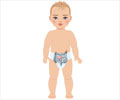Toddlers who learn a second language from infancy have an edge over their unilingual peers, says a new research

"By 24 months, we found bilingual children had already acquired a vocabulary in each of their two languages and gained some experience in switching between English or French," said senior researcher Diane Poulin-Dubois.
"We found the cognitive benefits of bilingualism come much earlier than reported in previous studies," the author said.
As part of the investigation, 63 toddlers were divided into groups of unilingual and bilingual infants. To assess levels of bilingualism, parents completed a language exposure interview and vocabulary checklists, while children completed 5 basic language and cognitive tests.
"Bilingual children outperformed their unilingual counterparts on tasks where they were distracted," said Dr. Poulin-Dubois.
"The small bilingual advantage that we observed in our 24-month-old bilinguals is probably due to a combination of infants' experience listening to and using their two languages," the author added.
Advertisement
Source-ANI








